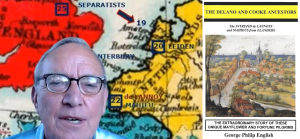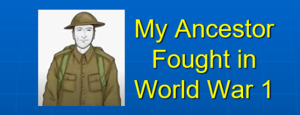We are the chosen, called to find our ancestors. To put flesh on their bones and make them live again. To tell the family story and to feel that somehow those who went before know and approve. We are the storytellers of the tribe.
We’re living in totally unprecedented times with this pandemic of COVID-19. And people ask me “Well, how can family history help in this situation?” So we’ve made this video to help you understand; and to share with you our thoughts on how family history can help us in these very difficult times.
In my career, I’ve done a lot of work with people in various ways and I’m going to share my experience with you about that, quite apart from genealogy itself. So how can tracing our ancestors, family history and genealogy help us now?
What we’re going to do is talk about:
Disasters our ancestors lived through – disasters are nothing new, are they?
Personal – I’m going to come on to my own personal experience of working with people in various ways, some suggestions and thoughts about the personal aspects of this.
Relationships – of course, very often we’re in the home with the family, the father, mother and the children, and there are various relationship aspects to that, both good and less good perhaps
How can Family History actually help us now in this situation.
Can we learn from the story?
Major disasters
Looking back in the past, there’s been various sorts of disasters. From a universal point of view, many, many countries have had wars, plague, famine, the Great Depression. One could go on with a list like that. Then from a personal point of view, there can be various things. Child deaths were very much a feature of the past, and various health problems. Poverty – there was no benefit system in the past. Individual things, job loss and many, many unfortunate things that happened. Relationships – there can be very good aspects to that, but we hear about domestic abuse and such things when it goes wrong.
18th and 19th centuries
Let’s look at some of these in a bit more detail. Typically, we’re researching back and particularly in the 18th and 19th centuries when our ancestors lived. There were enormous social, economic and other changes then. The Industrial Revolution – the United Kingdom became the first modern industrialized nation with 40% of the total world’s trade and that had a tremendous impact. A lot of people left the country and went to the towns and cities where the new industries were. The plus of that was they had jobs, they had more money and so on. The minus, a lot of things, but working conditions and living conditions were not ideal by any means.
Health, when we look back in the past, it’s dramatic really, the changes and the improvements we’ve made over the years. There were large families, partly because they expected many of the children to die. There were many illnesses that are cured easily now. Poverty – if one was poor, very often one went into the poorhouse, or you got some sort of benefit, perhaps from the church, but there were no social benefits or pensions when you retired.
Opportunities for women were very limited. Education – compulsory schooling only started towards the end of the 19th century. And values were different. People were much stricter in the past. We can argue for and against the various values. These were the kind of situations in which our ancestors lived.
War
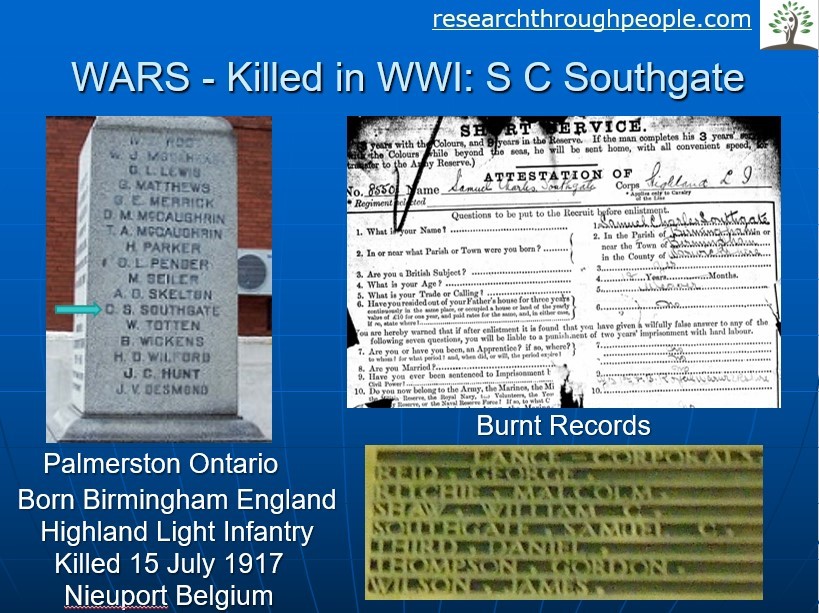
This example for war, we have SC Southgate. This is a War Memorial in Canada, and we were approached because they had been doing research on the people on this War Memorial. They had found out that Southgate actually came from England. Could we help? Could we find out more about him? So we did, and we found that he was born in Birmingham. He joined the Highland Light Infantry in the First World War, a Scottish regiment. He was on the Canadian War Memorial because he was killed, 15th of July 1917, at Nieuwpoort, Belgium. You may have heard of Passchendaele. He was killed in the build up to Passchendaele.
So, we had a look and one of the things with wars, records are kept. We found his First World War record. Now, there’s what’s called the Burnt Records, because ironically, in the Second World War, the Germans bombed the building with the First World War records in it. Many were destroyed, many survived, and then there were those which were affected by the fire and called the ‘Burnt Records’. As you can see, this record has been singed to an extent, but we found out a lot about Southgate in that.
We found his mother from this information. We looked for his birth, we knew when he was born. Could we find it? No. We finally found he was illegitimate and there are a whole lot of other things I could mention. He joined a regiment. What happened is very often cities had their own regiments. Glasgow had three regiments in the First World War, one of which was called the Tramways Regiment. Southgate joined this and we finally found there was another War Memorial to him in Glasgow that was for the Tramways Regiment. And there is his name on this Memorial. Wars can obviously cause tremendous problems.
Plague
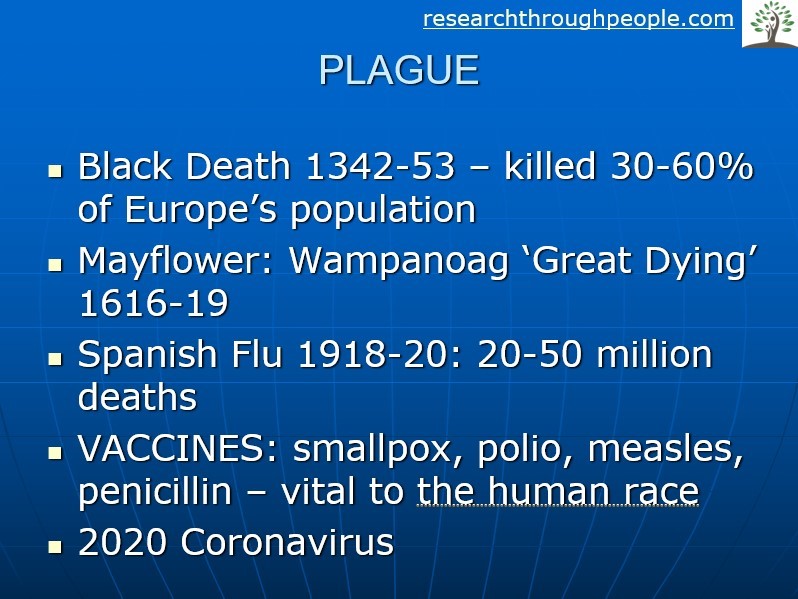
Pandemic is nothing new. In the 14th century the Black Death killed more or less half of the total of Europe’s population. And they had no knowledge to try and counter the plague. This is the 400th year of the Mayflower going to New England, and there they met up with the Indian tribe, the Wampanoag. They had had the ‘Great Dying‘ for three years before the Pilgrims arrived – 1616 to 1619. Whole villages were wiped out by this plague, and they would not have known what was happening or how they could deal with it.
After the First World War, all the deaths in that, Spanish Flu came along and killed another 20 to 50 million people. And the sad thing there, if a soldier got the Spanish flu, they put him on a train with a lot of other people and sent him to a camp with a lot of other people. Social distancing was not known then. That’s only a hundred years ago.
And vaccines, there have been tremendous developments. Smallpox used to kill 10% of the population. Polio has almost been eliminated. Measles has more or less been eliminated. Penicillin – Sir Alexander Fleming invented that. These things have been just vital to the survival of the human race. And here we are in 2020 with Coronavirus.

From a personal point of view, a family point of view, child deaths were a feature. Now, let’s look at this family, Joseph and Mary Ann Lough – they’re living in the East End of London. They got married in 1820 in St. Leonard’s Church in Shoreditch. And we have a copy of the Family Bible with Joseph’s handwriting as his children are born. And first daughter Mary Ann is born in 1821, christened in the Church. And then, Joseph Lough is born and dies 14 days later. William Lough dies a week after he’s born. Louisa dies 10 days after she’s born. Julia dies, she survived for eight months. But these four children all died before the age of one. And then along came Eliza, and she survived. And then Alfred, and he survived. And Emily and Edwin. So, they now had four children who survived.
But, Emily died after a couple of years. Then Frederick was born and he died – January to June, so what’s that, five months? James was born and died the following day. And then finally they had twins, born in 1838. And Eliza, she died at age 10, she got tuberculosis. Very common in the 19th century. If you look at this family, only five of their 13 children survived, the ones in yellow. Ironically, the very first child survives, the next five die, and then the two twins survived. How does a family cope, how does the mother cope? A lot of letters have survived from that family, and they coped with faith, basically.
Family Disasters
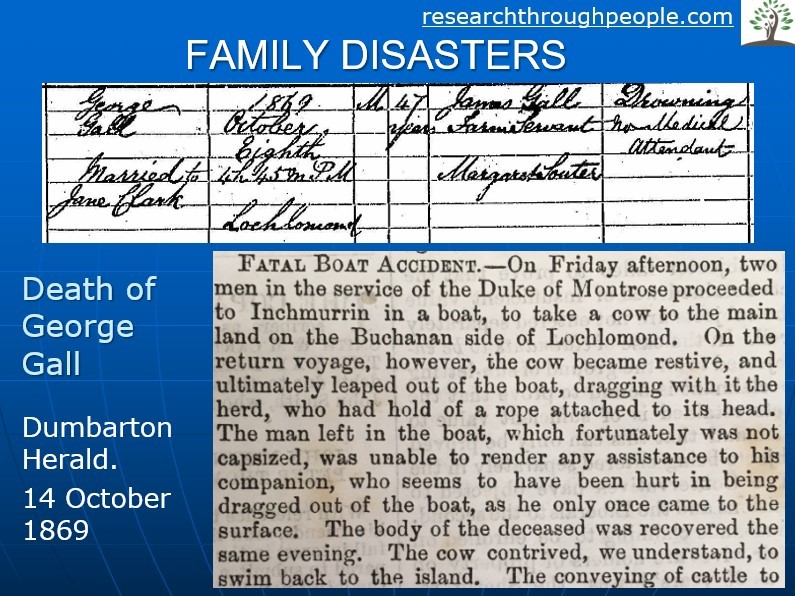
Here’s one in Scotland, George Gall, age 47, and he dies in Loch Lomond. Hmm, strange. Well, we thought, that’s an unusual thing, let’s have a look, and we found a newspaper report of the fatal boat accident. He was in a boat taking a cow across Loch Lomond, and on the return voyage the cow became restive and jumped out of the boat. George was holding the rope, got dragged into the sea and drowned. And there’s a family with eight children in their teens and younger – suddenly the father, the breadwinner is gone. Our ancestors have lived through such things.
My Experience with People
As I said, in my career I’ve done a lot of work with people, at all levels in organizations, big organizations, small organizations, public, private; and done things like Personality Analysis. Very interesting. Most people are more aware of their Areas for Improvement than they are of their Strengths. It’s their Strengths that, of course, help them achieve things; their Areas for Improvement that hold them back. I’ve done Counselling, Stress Management, Teamwork and related things.
Personal
So I’m going to share with you some of the things and advice that I’ve learned over the years. A key thing is to set goals. What are we going to achieve? And then to measure the progress. Now, an obvious thing, particularly in lockdown, is to set a goal to lose weight. And what’s good is to pick at least two actions. So, it might be to diet and to exercise.
Now what we’re doing, we’re trying to manage change for a positive result, and there are three phases of managing change. One is to unfreeze the current behaviour. So whatever it is that’s causing us to be overweight, we then need to change what we do. And it’s very interesting to hear how many people are now going out and walking and exercising, or watching Joe Wicks, and doing things they hadn’t done beforehand. But then the key is to refreeze that behaviour, make it part of your routine. It’s going to be very interesting to see when the lockdown finishes. People get out more and return more to their normal way of life. Have people refrozen this new way of life which makes them fitter and makes them lose weight as well?
Now, Flow Experiences. What this means is things we do that make us lose track of time. A whole lot of examples. There could be things like relaxation, meditation, particular things like that. It can be reading, getting lost in a book. All sorts of hobbies. Being with family and friends, a whole lot of things, but things that take our mind off time – a Flow Experience is the expression.
Prevention. Now, prevention’s a very good way of thinking. How can we prevent things going wrong in future, particularly when something has gone wrong? Very good to sit down and say, “Well, I wonder what we could have done to prevent that in the first place?” Very useful in all sorts of ways. Very important to stay positive, fit and healthy. If we’re losing weight, that that will help. Because it would be very easy to be very negative in this situation, particularly people whose jobs are threatened and their life is threatened in various other ways.
I’ve put the word self-esteem in here. This is what happens when we have discovered that we’ve got certain abilities, talents which we can use. If we work hard at them, we can make them better, very often with the help of others. Very important in bringing up children. What we want is our children to reach adulthood with a feeling of self-esteem. And it’s something we build. Very important to reinforce that with recognition and reward when they do the right thing; and not fall into the trap when, for example, they throw a tantrum, but 2 minutes later, end up with a bar of chocolate to appease them. Children learn what they live. Part of self-esteem is self-discipline, and what we try and do when they are younger is give them discipline to enable them to channel their abilities in the right direction.
And avoid “Negative Copers“ like alcohol, drugs, overeating and smoking. Very easy to fall into that, very easy to think it’s a treat. Fine in the short term but it can cost a lot in the long term. When we do research, we sometimes find that the father was an alcoholic with the negative consequences for the family. So try and replace these with positive copers!

Relationships
Relationships – this is when people are together. If we have the family together, we have the mother and father, and the relationship between them; and then there’s the children. How can we make sure we get the positives out of that; and try and avoid some of the negatives? A very crucial thing to recognise is that when things go wrong, when you first marry perhaps, is that people don’t understand each other very well. But they don’t understand themselves very well either. And this comes up time and again. We hear unfortunately about domestic abuse. Often those people don’t realise in themselves. They think they get their own way. But there are other ways of dealing with things that could be so much better for them, quite apart from the other person. Learn to understand more; and judge less. Don’t jump in.
Parent/Adult/Child. There are 3 roles in life that we have – Parent, Adult and Child. Relationships are good when both parties accept that. So, if a Parent treats the Child like one and the Child accepts that as fair. Very often, teenagers are trying to be an Adult but may feel treated like a Child. Then, when we are an Adult, we want to be treated as Adult to Adult. A simple example – we may have “what’s the time?” Adult to Adult statement. If the reply is “Time you bought a watch” that Is Parent to Child. That’s when things go wrong. A very useful way of thinking about relationships. When we lose our temper, we tend to revert to childlike behaviour.
It’s so easy to focus on the person in arguments. Think about focusing on the process, rather the person. Try and depersonalise things so you can talk objectively and constructively about what’s going on.
Recognition is so important. When someone does something right, recognise it, because it’s not only a nice thing to hear ‘well done’ or ‘thank you’ but it also says that the person has noticed what they have done. And you should be recognising in at least 5 out of 10 statements that you make to another person.
Listening There is an expression “we have two ears and one mouth; we should use them in proportion”. Use questions to listen and understand what the other person is thinking. Share your feelings but not in an angry way, Say, tell me what you felt when I did that. Put yourself in the other person’s shoes. And keep learning. We’re always learning, We could always do better. Don’t think that you know it all.
How can Family History help during COVID-19?
To finish up, let’s think about how all this channels into Family History, particularly during this COVID-19 situation. Let’s find out as much as we can about our ancestors as far back in time as we can, grandparents, great grandparents. Not just when and where they were born/married/died; but where did they live; what jobs did they do? What sort of conditions did they live in?
And elderly relatives: they will have memories going back, not only through their lifetime maybe 70, 80, 90 years. They will have met people who were born in the 19th century, maybe 150 years ago. It’s an ideal time to get their memories and stories, the juicy bits that put flesh on the bones and bring our ancestors to life.
I mentioned a number of things earlier: Flow experiences are very useful here; focusing on the process not the person because when we have our ancestors, we can focus on them not ourselves; talk about their feelings.
A very key part of genealogy is saying “What is the evidence for that?” We live in a social media world where there are all sorts of uninformed opinions out there; and that’s before you get to the fake news and the deliberate lies. So, don’t just get an opinion from someone else, ask what is the evidence for that. Because what we want to do is be Informed, Objective and Balanced. So often what we hear is uninformed, subjective and very one-sided.
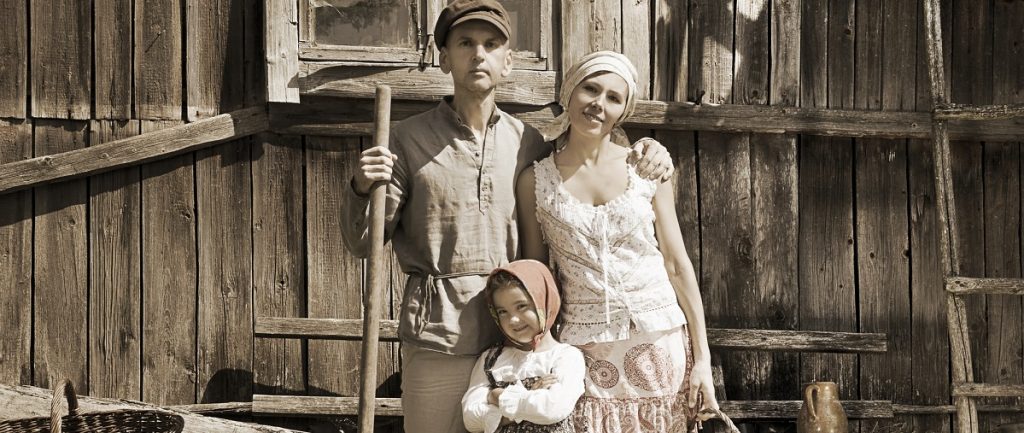
Now what we can do with our ancestors is Role Play. Imagine you were your 19th century grandparents – there is the man as the breadwinner, believing it important not to show his emotions; woman at home with the full-time job plus of bringing up lots of children and looking after the home. Talk about what that’s like to depersonalise the situation. Then maybe you can talk about ‘how does that apply to us today?’ Understanding the feelings of other people and events.
Quiz – especially for children. We don’t want to overburden them with things but Quizes can be very useful. I’ve just done one for my grandchildren where I asked them 5 questions about the First World War, and 5 about the Second one. One or two fairly easy ones but one or two thought-provoking ones like’ What was a Mulberry Harbour?’. We can use that to help to discuss things. There’s this expression ‘Who Do You Think You Are?. We want to move to ‘Who Do You Know You Are?’
Thank you very much. I hope you found that helpful. We find Family History so interesting; if we can help you to find out more about yours, that’s great. The way we work, you send us some information, we’ll have a look at it – a free consultation – and then we come back to you with the options that we suggest. Typically, we have a Gold, Silver and Bronze package. What we want to end up with is you knowing how much it’s going to cost; and us knowing how far to go with our researches. You can get in touch via our Contact page, or you can email info@researchthroughpeople.com. We’ve got a 10% introductory discount at the moment – just quote ‘Explore 1’. We look forward to hearing from you. Thank you.

